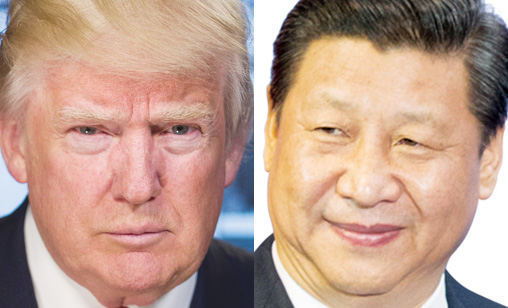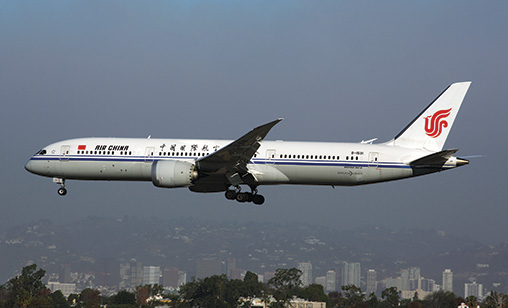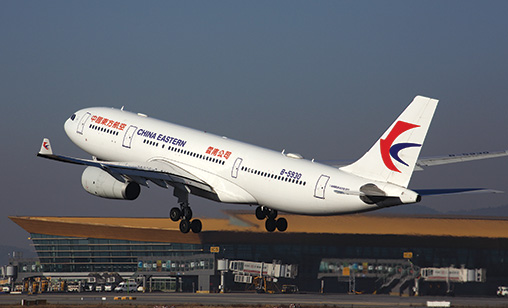News Backgrounder
Trump’s unwinnable tariff war with China
How severely will the U.S. aerospace industry be impacted by U.S. President Trump’s planned tariffs on Chinese imports?
May 1st 2018
Business leaders worldwide know there is only one outcome of a trade war. Read More » “The thing about the tariff war is these things always end badly,” Sir Rod Eddington, a former CEO of Cathay Pacific Airways and British Airways, said in a Sydney address last month.
“This one will be no different. Unlike the President of the United States, I don’t think trade wars like this are winnable. Everybody loses and this will be no different.”
 |
U.S. president Trump has announced a proposed list of 1,300 products, mainly Chinese exports of mechanical and electrical products, but also including a 25% levy on steel and a 10% tariff on aluminum. The latter is critical to aircraft manufacturing.
Intended to address the US$375.2 billion trade deficit with China, it has resulted in an announcement by China that it would impose a 25% tariff on 106 products, including soybeans, cars, chemical products and passenger aircraft.
For now, these measures remain proposals and have not been passed into law. In the U.S. there is a 60-day period for the public to provide feedback on proposed legislation and the U.S. Senate and Congress also can hold hearings on critical issues such as new tariffs.
Nevertheless, as a result of president Trump’s decision, a trade war appeared inevitable and markets reacted accordingly. Boeing shares took a hit and there was talk of Chinese airlines cancelling orders of the manufacturer’s aircraft.There was concern too that the dispute could have a serious effect on freight, which is critical Asia-Pacific airlines’ income.
“Demand for air cargo continues to be strong with 6.8% growth in February,” said International Air Transport Association (IATA) director general and CEO, Alexandre de Juniac.
“The positive outlook for the rest of 2018, however, faces some potentially strong headwinds, including escalation of protectionist measures into a full-blown trade war.
Prosperity grows when borders are open to people and to trade and we are all held back when they are not.”
China Eastern Airlines did warn that a brewing trade war between China and the U.S. could prompt it to adjust capacity and frequency on associated routes. The trade war could have “a certain impact” on passenger and cargo business, said the airline’s CEO, Ma Xulun.
Ironically, as the proposed tariffs were being debated, the world’s largest express freight operator, FedEx, announced last month that for the first time it would operate directly from its hub at Memphis to Guangzhou.
So, what is the reality of the war of words about a trade war? JP Morgan analyst, Seth Seifman, wrote in a recent note that “the impact should be small as aluminum prices increased by more than 30% last year, significantly more than the proposed tariff and that [increase] had little or no discernible effect on Boeing and most major suppliers”.
“If we assume aluminum accounts for 70% of the weight of a B777 or B737 - it is far lower on a B787 - and that materials account for 30% of the price of an aircraft, then a 10% increase in aluminum is a less than a two per cent increase in the price of more metal-intensive aircraft.
“Steel is such a small component of aircraft that the tariff impact should be negligible. Boeing will have to consider these higher costs in pricing future aircraft deals, but lots of cost and price variables move around all the time. So a low-single digit change does not seem like a showstopper.”
 |
 |
As for aircraft orders, it is unlikely Chinese airlines would cancel aircraft orders or even draw back from future purchases, although there has been some rhetoric that hinted at such an action. In March, Guangzhou-based China Southern Airlines ordered 30 B737s for its Xiamen Airlines subsidiary.
At a press conference a week later, the airline group’s chairman, Wang Changshun, said the order would be threatened if the U.S. engaged in a trade war. The reality is Boeing and Airbus have huge backlogs for ordered aircraft that will keep their production lines churning out aircraft for a decade.
Seifman pointed out China’s proposed aircraft tariffs appeared calibrated to avoid a major impact on Boeing. The threatened 25% levy on aircraft is based on an aircraft’s weight. It would apply to planes that weighed between 15,000 kilograms and 45,000 kilograms. It is a range that targets a generation of B737s that are nearing the end of their production run. All but one model of the B737 MAX family would be exempt.
Even the argument that tariffs would present Airbus with an advantage over Boeing is doubtful, in part because China’s practice is to balance orders between the two companies. “While both governments have outlined positions that could do harm to the global aerospace industry, neither has yet imposed these drastic measures,” Boeing said in a statement. “We will continue in our own efforts to proactively engage both governments.”
It should not be forgotten that Boeing, like Airbus, has a significant manufacturing and support structure in China that provides thousands of skilled jobs in China.
It also is far too early for Chinese airlines to turn the country’s new single-aisle jet, the C919, into a replacement for western commercial passenger aircraft, especially as the aircraft had its first test flight as recently as December.
“In the best case scenario, COMAC would need another five or six years to reach respectable production capacity,” said an analyst at AirInsight, Michel Merluzeau. “In the short term, China has no choice [but to keep buying non-Chinese aircraft] unless it wants to put the brakes on its air transport growth,” he said.
As expected, China has not been slow in its reaction to U.S. threats. A Chinese Ministry of Commerce spokesman, Gao Feng, said Beijing would not hesitate to take all vigorous actions possible if faced with escalated trade friction with the U.S.
“The U.S. side has been fairly unreasonable, has seriously misjudged the situation and adopted extremely wrong actions to ‘lift a stone, hitting its own feet’. The Chinese side is fully prepared and will not hesitate to fight back immediately with all options possible,” Gao said.
By press time, tensions had eased and political positions had shifted. President Xi Jinping threw cold water on a full on trade war in a widely covered public address and added China’s 25% tariffs on vehicles manufactured in the U.S. would be slashed.
More importantly, he said China would respect U.S. intellectual property rights and work for a meaningful solution. President Trump promptly thanked President Xi in a tweet!
“We’re keeping a close eye on our supply chain, but at this stage and based on our preliminary assessment, we don’t expect the direct impact of steel and aluminum costs to have any material effect. However, this is something we’ll continue to watch,” a Boeing Commercial Airplanes spokesman told Orient Aviation at press time.
“At this point we’re assessing the situation and information available to determine how it may or may not impact us, but we’re confident that dialogue will continue and we’re continuing to proactively engage both governments.”